- Home
- Matt Hilton
The Shadows Call Page 4
The Shadows Call Read online
Page 4
Finally, about three a.m. on the Sunday morning, I kicked free from my sleeping bag, and immediately felt the slick of night sweat cooling on my body. I shrugged into a T-shirt and jogging bottoms. I was right at the top of the house, in the room I’d earmarked for my master bedroom, despite the fact it was still a relatively empty space. My sleeping bag was where my soon-to-arrive bed would be situated and I’d also brought up a lamp, so I could read. There was a dog-eared thriller novel I’d been making my way through unopened against the wall. I’d also plugged my mobile into a socket, recharging the battery. I switched on the lamp and picked up my phone. Piggy-backing a nearby BT Wi-Fi Open Zone, I could get the internet on it. Opening a browser I typed in “I MET A MAN WHO WASN’T THERE” and was offered various links to pages describing an old rhyme by William Hughes Mearns.
Following the link to a Wikipedia page, I discovered that I’d been repeating lines from a poem written in 1899 but first published in 1922 under the title “Antigonish”. I’d only been repeating the first few lines of the rhyme, and those following that I read didn’t help my unease. Especially when I glanced at the time display and saw the correlation.
“When I came home last night at three
The man was waiting there for me
But when I looked around the hall
I couldn’t see him there at all.”
I quickly swiped the webpage shut and put down my phone.
‘This is frigging nuts,’ I told myself out loud. ‘Stop now. You’re letting your imagination get away from you.’
I was allowing my imagination to run wild. I didn’t believe in all of that hocus pocus, mumbo-jumbo bullshit. Sure there had been a few unusual occurrences in my new house, but that was to be expected. “New house” was a misnomer. It had stood on this ground for more than a century and a half, a long time before the roads were ever expected to carry the volume and weight of traffic they did these days. There would be an element of subsidence; there’d be vibration; settling of the building on its foundations. I also knew that the house had stood empty for a long period. Simply by opening the doors, allowing the ambient atmosphere to shift was enough to cause a chain reaction as floor boards, doorframes and support joists all shrunk and contracted, or indeed swelled and expanded, dependent on the ambient temperature. Such movement would have an unexpected effect on the structure, causing doors to seemingly jam in their frames one second, spring free the next. It could even explain why a phone sitting on a bathtub would appear to jump in the air. All it would take was for a large vehicle to pass on the street outside, the vibration to pass through the building, and cause the metal tub to rattle and throw off the phone.
Yeah, I decided. That was it.
It didn’t however explain how Sarah’s iPhone had made it all the way from her handbag, up one flight and into the bathroom. I sure as hell hadn’t taken it there, so Sarah must have. Sometimes, as I’ve already suggested, you can perform tasks on almost remote control, trance-like. You have no recollection of having carried out the task, the way I believed that Sarah had. She’d visited the loo, taking her phone with her. Had perhaps placed it down on the edge of the bathtub while she washed her hands at the pedestal sink, then neglected to retrieve her phone when returning to her chores in the living room. I’d experienced similar events, many times at the wheel of my car. There were examples where I’d driven miles, negotiating roundabouts and busy junctions, only to later realise I was further along my journey than expected, with no clear memory of having got there. Maybe our brains have a capacity for blocking out the mundane. That had to be the explanation. It was logical. Sound. Made sense.
But that went no way towards explaining the shadow I’d witnessed. Not once but twice.
The man who wasn’t there.
‘Aw, for God’s sake! Come on, Jack. Get a bloody grip, will you?’
I didn’t believe in ghosts.
I’ve said it before, but I reiterated it to myself once more.
‘You asked for proof, demanded it, but got none. Why would it be any different this time?’
I suddenly realised I was standing at one of the bedroom windows, peering down at the street outside. It was late, or very early depending on how you marked the progress of your day. A young couple wandered by, looking a little worse for wear from the way they staggered, arm in arm along the street. Their voices were loud as they cajoled each other on, but muted by distance and the almost tangible weight of the night. To them it would be late: an end to their Saturday evening on the town. To me, who usually rose quite early for work, it was already Sunday morning. I’d no need to be up at this ungodly hour. Normally I slept in to around mid-morning on a Sunday – my only real day of rest. But this Sunday was different. As part of the cheap deal on my rent, I’d agreed with Muir that I’d see to the necessary work to get the place up to a habitable standard. I had much to do and the weekend would soon be over.
‘I’m awake now.’ I stated the obvious, and to no idea who. ‘May as well make the most of it.’
I found my trainers and pulled them on. Neglecting to tie them, I shoved the laces under the tongues of each shoe. Had the house come with carpets I wouldn’t have bothered with footwear, except here I’d come across a few floorboards where the heads of nails protruded, or where the wood itself had cracked and laid a trap of jagged splinters for the barefooted. Now, I supposed, would be a good time to solve those minor problems.
My only neighbours were those employed at the insurance brokerage. But they’d shut up shop at 6 p.m. and I doubted there’d be anyone in the building at this hour on a Sunday morning, not even a night watchman. Hammering in nails I’d make a racket, and it would be more of an inconvenience to the office workers if I chose to do it during a weekday. My tools were downstairs. I went to find them, switching on lights before I progressed.
I found my tools in their plastic carrying box in the parlour, and dug out a claw hammer, a chisel and some sandpaper. The door was still propped open on its wedge of wood. Tools clenched ready for action, I wandered out into the hall, trying to decide where best to start. The front door was as good a place as any: concentrate on the well-trodden paths first, I thought, and work into the other rooms as you go. There were some black plastic sacks piled in the vestibule, filled with trash Sarah and I had collected earlier. I moved them, checking the floorboards for rogue nails and splinters. Here in the hall the boards were largely free of protrusions, but I did sand down a couple of boards, mainly to get into the swing of things. Next I went into the living room alongside the parlour. Sarah had swept it clean. I’d put a bulb in the ceiling rose and the light was stark. The wallpaper was stained. In the less than enlightened eighties when this had last been a dwelling, its occupants had been heavy smokers. The ceiling and upper corners of the room were caramel in colour, and the nicotine stains extended half way down the walls. It was ingrained in the wallpaper, the paint on the window frames, but old enough that there was no hint of the tarry smell. Some people would be disgusted, not me. I’d had a thirty a day habit until very recently so who was I to criticise?
Crabbing around the floor, I knocked in nails and then chiseled out a large splinter of wood, smoothing the edges with the sandpaper. It took minutes at best before I moved on. I’d barely visited the rooms on the first floor yet, and now would be no different. The bathroom on the lower split-level had a floor covering – “oil cloth” I think it was called – so I continued up the stairs, knocking and banging as I progressed, and onto the first landing proper. The stained glass window was directly behind, and slightly above me, and I paused to look at it over my hunched shoulder. No late evening sunshine spilled in now. The window reflected the interior light, looking more like a mosaic than ever.
I’ve heard of the term “matrixing”. It’s the capacity of the human brain to recognise familiar images in random patterns, like seeing the man in the moon, faces in the clouds. Apparently it’s an inherited trait, the ability that allows a newborn baby to recognise the face of its mot
her. When I peered up at that window I too thought I saw a face, one that was familiar. But the second I blinked, the pattern was gone, and the jumble of coloured glass wouldn’t give up its secret a second time. Nevertheless I had seen that face and a sense of unease wormed its way through my guts. A prickling sensation ran from my neck to the crown of my head, as if a faint electrical charge danced in my hair. I scrubbed the sensation away, forced the face from my memory and bent to my task again.
My injured knee was killing me. But it would be no less painful if I gave up on the job and had to return to it at a later stage. I gritted my teeth, continued my way along the hall, hammering away. I bypassed the two rooms and was then faced with the room at the front right I’d earmarked for a junk closet. The door was open, and I paused. I didn’t recall opening it. Then again, I didn’t remember closing it either, or even noted its position while working. I grunted as I stood, using the near wall for support. I lifted my right heel, manipulated my foot side-to-side, and could feel the angry remonstration of the muscles above my kneecap. Placing down my foot, I tested the leg for stability. Sore but firm enough. I limped into the junk closet and stood looking around. I hadn’t got around to fixing a bulb in the light fixture yet, but there was enough of a glow from the streetlights outside.
There wasn’t much to see. A square box about twelve by twelve feet. Bare plaster. In one corner some of the plaster had blown from the brickwork and fallen chunks lay piled on the floorboards. There was only one small window, and if viewed from the street outside it was situated directly over the front door. I peeked through it. By now it had to be nearing five o’clock and even the last stragglers from the nightclubs had made it home. The street outside was still and quiet. All I could hear was my own breath – in and out.
Not true.
Beyond my internal noises I could hear a soft murmur, so indistinct it was barely recognisable as a human voice. I craned nearer the window, checking for anyone on the street, but there was no sign. On other mornings people would be out by now, heading for the early shifts at the factories, but I doubted that was the case on a Sunday morning. I held my breath, listening hard. I could make out a cadence to the mumbling, high then low, as if a radio volume button was being turned up and down, but never to a point where the voice was loud enough to make out individual words. Turning from the window, I stood again. The voice didn’t originate from outside but from somewhere within the house.
An illogical fear crept through me, like a dull weight that crept from my gut and formed a hand to squeeze round my heart. I sucked in air. Took a firmer grip on my hammer.
As I moved for the hallway, I realised that the sound grew louder – not much, but I could now make out that that rise and fall in tone was because there were two different voices. Male and female. For the life of me I still couldn’t make out what was being said: the language was English, I was certain, but the capacity of my hearing wasn’t enough to make out the mumbled words. Out of the door, I paused again. The hall was lighted, and I could see the stained glass window and top half of the bathroom door at the far end. The doors were shut to the two living spaces to the right. The sound of voices didn’t filter from that direction, but from my left. A shudder went through me as I realised that the conversation was emanating from somewhere above me, from up near or in my bedroom.
Was I afraid?
Maybe, but I was more intrigued at that point. I was confident that no trespassers had found a way inside, and they certainly hadn’t had an opportunity to get by me while working in the halls and up the stairs. But there were undeniably voices and I wanted to find out their source. There had to be a logical reason. And I thought I knew what it might be.
Earlier I’d used my phone when browsing the Antigonish poem, and I convinced myself that when I’d put down the phone then I’d accidentally hit a button and set my voice messages playing. Perhaps the programme was stuck in a loop and had been playing the saved messages for the last couple of hours, and I’d been unaware of the faint voices while hard at work.
I went up the narrow stairs, shoulders brushing the warped plaster walls. Though I was positive I’d figured out the source of the voices – what else could they be? – I clutched the hammer in one hand and the chisel the other, rudimentary weapons of defence. I’d not stopped listening to the conversation, still trying to make out if the voices were familiar, but the shwish-shwush of my shoulders on the wall, the steady creak of my feet on the stairs, covered it. As I reached the short hall, I found I was crouching, with my weapons held before me, and it was a strain to straighten up and relax my aching spine.
A whisper.
That’s all the voice was.
I turned immediately right for my bedroom, then looked where I’d left my mobile plugged in to recharge. The screen was dimmed, but that meant nothing. Placing down the chisel, I moved the hammer to my left hand, and picked up my phone. I placed it to my ear even though I needn’t. I could already tell that the faint murmur was from behind me. The static sensation in my hair was back, but this time it extended the length of my spine. I felt the sudden need to visit the loo. Along with the movements in my bowel, I felt a tightening of my scrotum as I prepared for fight or flight: now I was genuinely frightened. Someone had gained entry to the house.
I knew I wasn’t much of a scrapper, but faced by the prospect of tracking down a house invader, I experienced a sudden charge of atavistic fury and a large spurt of adrenalin. I nigh on leapt into the next bedroom, swinging around my weapons like a barbarian swordsman, and hollering a challenge.
The room stood bare, but for the graffiti on the walls and the scabby curtains.
One tatty curtain stirred, fluttering gently.
I stepped back as if expecting the thing to throw itself over my face like a dead man’s shroud.
Fuck me, Jack! It’s only a bloody breeze! Likely some of the putty had come loose from around the windowpane, letting the wind and outside noise in.
Exhaling deeply, I made for the window, pushed aside the curtain. It was greasy with mould. I wiped my hand on my pants and peered down on the back yard. No streetlights aided my vision, but there was enough light in the moonlit sky to see that the narrow yard was clear. I couldn’t see all of it; the bathroom extension butted out a good distance and somebody could be in the space beneath it, adjacent to the back door. If they’d hid there, they weren’t the source of the voices. Again I realised the words came from over my shoulder, and now the hand that had earlier gripped my heart was back and it gave it a solid squeeze.
There was only one room I hadn’t checked on this floor, the closet containing the dumbwaiter. Why did that narrow, webbed space fill me with such dread?
6
Jack in the Box
Irrational fear is every bit as debilitating as genuine fear, sometimes greater than. The symptoms are much the same, except that groundless distress can be magnified by the very nature of being afraid of something you don’t understand, you don’t grasp the full extent of the danger and therefore fear it all the more. It would explain why sweat poured down my back and from my hairline, cold and slick, and why I had to hang tightly to the hammer and chisel in case they slid from my wet palms. My breath was now coming in short, shallow gasps. I was shivering, but not from the cold.
I stood facing the closet door, and an absurd thought kept demanding an answer.
How the fuck could two people even fit in that small space?
I already knew the answer.
They couldn’t. It was an impossibility.
And yet I could hear their voices.
They were now just faint rasps, as if they knew only the door separated us, and had hushed their conversation as they plotted their next move.
What was the most absurd and irrational thing of all? I was convinced that the voices sounded familiar.
This had to be some elaborate hoax, a prank formulated by my workmates, and Sarah in particular. She was the only colleague who’d been in the house. Had sh
e smuggled in a recording device or something, and hidden it in the dumbwaiter closet, with the intention of scaring the bejesus out of me? Had she deliberately concealed her iPhone in the bathroom earlier, then claimed it had been moved by invisible hands, to add validation to this intricate joke? Weirding me out, setting me up for when I was hit by this punch line?
OK. It was a ridiculous theory, but what the hell else did I have?
It was either a joke, there were a couple of burglars in my closet or...
I was making excuses for not opening the door.
Scared of ghosts, Jack?
I didn’t believe in ghosts, for fuck’s sake!
Setting my jaw I yanked open the door, the hammer drawn back over my shoulder. I roared like a lion.
Nobody was there.
How could there have been? The bottom half of the cupboard had been filled by a box-like structure, through which the dumbwaiter rose and fell, and the lift mechanism itself filled most of the top half. There was nowhere even a contortionist could hide.
The voices had fallen silent.
The sudden quiet was equally as disturbing as the whispering before. It told me that the conversation had not come from a recording device or anything like it: the voices had stopped because the speakers knew I was there, listening.
Dusty cobwebs formed a mesh over the opening to the dumbwaiter. The weave puffed back and forward, and I imagined some colossal black spider lurking just out of sight, teasing me with delicate movements of the web. Inviting me to closer investigation when it could leap out and grasp me in its skull-piercing mandibles. It took a moment to realise it was my own breath that stirred the web. And the realisation only added to my already growing sense of foolishness.
The dumbwaiter shifted side to side, very marginally, shaken by some breeze from below. As it moved there was a corresponding squeak, and in the next second it budged again and the creak that followed was deeper in tone. I stood there feeling like an idiot. The noise had a rhythm to it, a cadence, and if I stretched my imagination enough it sounded like the back and forward chatter of a male and female.

 The Girl on Shattered Rock: A gripping suspense thriller
The Girl on Shattered Rock: A gripping suspense thriller Collision Course
Collision Course Blood Kin
Blood Kin The Fourth Option
The Fourth Option Hot Property: A Joe Hunter Short Story
Hot Property: A Joe Hunter Short Story Red Stripes
Red Stripes Dead Men's Dust
Dead Men's Dust Judgement and Wrath
Judgement and Wrath Dead Men's Harvest
Dead Men's Harvest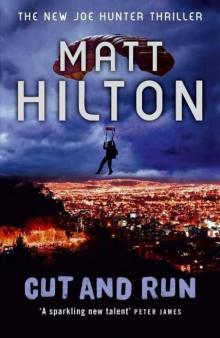 Cut and run jh-4
Cut and run jh-4 Blood and Ashes jh-5
Blood and Ashes jh-5 Preternatural: Carter Bailey Book 1
Preternatural: Carter Bailey Book 1 Darke
Darke Blood and Ashes
Blood and Ashes The Shadows Call
The Shadows Call Raw Wounds
Raw Wounds The Devil's Anvil
The Devil's Anvil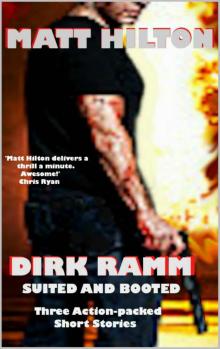 Dirk Ramm: Suited and Booted
Dirk Ramm: Suited and Booted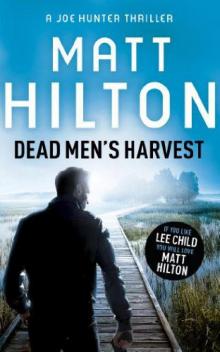 Dead Men's Harvest jh-6
Dead Men's Harvest jh-6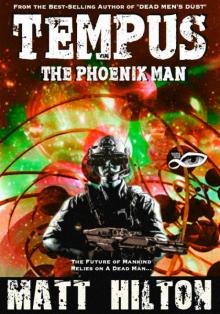 Tempus: The Phoenix Man
Tempus: The Phoenix Man Painted Skins
Painted Skins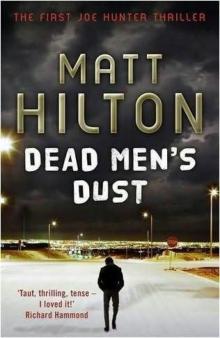 Dead Men's Dust jh-1
Dead Men's Dust jh-1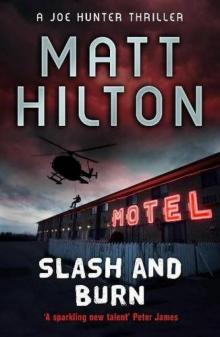 Slash and burn jh-3
Slash and burn jh-3 Dead Fall
Dead Fall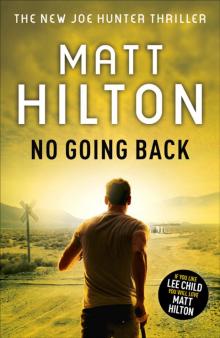 No Going Back - 07
No Going Back - 07 Judgement and Wrath jh-2
Judgement and Wrath jh-2